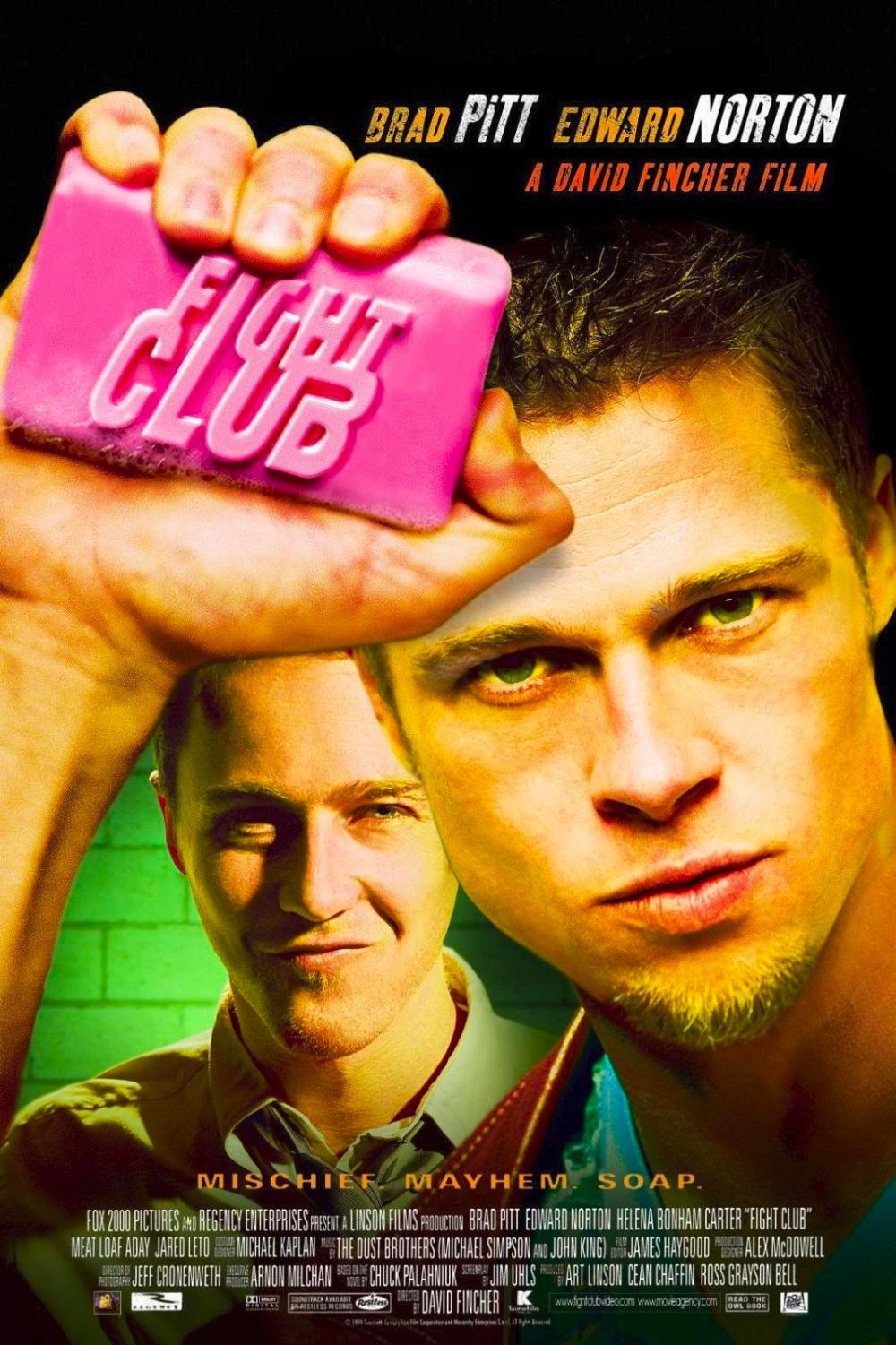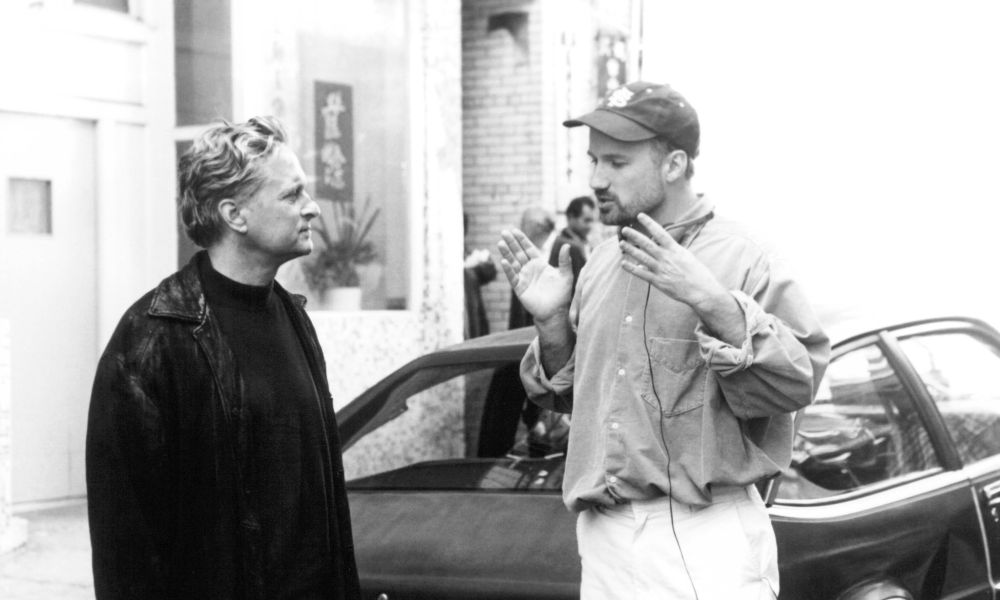"There is an unresolved tension in Fincher between the slick stylist who fashions advertisements for the highest bidder and the angry nihilist who forces challenging, subversive films like Se7en and Fight Club throughout the system." - Tom Charity (The Rough Guide to Film, 2007)
David Fincher
Director
(1962- ) Born August 28, Denver, Colorado, USA
Top 250 Directors / 21st Century's Top 100 Directors
(1962- ) Born August 28, Denver, Colorado, USA
Top 250 Directors / 21st Century's Top 100 Directors
Key Production Country: USA
Key Genres: Drama, Thriller, Psychological Thriller, Psychological Drama, Police Detective Film, Crime Thriller
Key Collaborators: Ceán Chaffin (Producer), Donald Graham Burt (Production Designer), Kirk Baxter (Editor), Angus Wall (Editor), Jeff Cronenweth (Cinematographer), Trent Reznor (Composer), Atticus Ross (Composer), Brad Pitt (Leading Actor), James Haygood (Editor), Howard Shore (Composer), Scott Rudin (Producer), Darius Khondji (Cinematographer)
Key Genres: Drama, Thriller, Psychological Thriller, Psychological Drama, Police Detective Film, Crime Thriller
Key Collaborators: Ceán Chaffin (Producer), Donald Graham Burt (Production Designer), Kirk Baxter (Editor), Angus Wall (Editor), Jeff Cronenweth (Cinematographer), Trent Reznor (Composer), Atticus Ross (Composer), Brad Pitt (Leading Actor), James Haygood (Editor), Howard Shore (Composer), Scott Rudin (Producer), Darius Khondji (Cinematographer)
"David Fincher is a devotee of darkness. Scene after scene in his films takes place in cramped, sparsely lit rooms where malignancy seems to hang in the air like ineradicable damp. For the shadows that pervade his films are moral and psychological no less than physical. Using darkness as a metaphor for evil and danger is hardly original—it is the entire basis of film noir, for a start—but Fincher brings to the banal equation a degree of emotional intensity that reinvigorates it. The darkness in his films is organic, the element in which his characters swim." - Philip Kemp (International Dictionary of Films and Filmmakers, 2000)
"It's to David Fincher's credit that his films take place somewhere beyond our edge - yet in a recognizable extension of our nightmares. As such, he has an interest in film noir, science fiction, and a kind of sardonic speculation, plus the ability to cross over from one to another." - David Thomson (The New Biographical Dictionary of Film, 2002)

Zodiac (2007)
"There is always a tendency toward flashy technique in Fincher's output. While impressive, it can add up to genius, as in Fight Club, or echo emptily, as in Panic Room. A matter of subjective perception, yes, but the brilliance is in manipulating movie form and technology to tell stories filled with nihilism and violence, which nevertheless describe a journey to redemption." - Garrett Chaffin-Quiray (501 Movie Directors, 2007)
"There are some recurring themes in his work, such as troubled, outsider white males. They are often violent (as in The Killer and Fight Club), or at least wilfully anti-establishment (Mank, The Social Network), and sometimes serial killers (Seven, Zodiac and the Netflix series Mindhunter)." - Steve Rose (The Guardian, 2023)
"One of the more accomplished directors to have emerged from the field of music video, David Fincher has thus far demonstrated a striking consistency of vision. Notable for their focus on dystopian despair, social decay and moral breakdown, his films are equally distinctive through their thoroughly postmodern cynicism. This is complemented by a recurring commitment to striking formal and stylistic design which frame the films' thematic resonances in an often stunning visual schemata." - Neil Jackson and Ian Haydn Smith (Contemporary North American Film Directors, 2002)
"As one of the younger directors in today's Hollywood, Fincher's skill at conveying a sense of darkness and foreboding should stand him in good stead for some years yet." - David Quinlan (Quinlan's Film Directors, 1999)
"With only a handful of credits tucked under his belt, wunderkind prodigy David Fincher became one of the most celebrated artists to scale the heights of Tinseltown during the late '90s and early 2000s. Although Fincher met with some derision early on, as the director of the critically excoriated Alien 3 in 1992, his work on Seven three years down the road won him critical approval and unanimous acceptance across the industry, and marked only the beginning of an influential, splashy career." - Rebecca Flint Marx (Allmovie)
"His slick and glossy treatment of a dark world frequently garners accusations that his films are shallow experiments in style. It is more accurate to say that Fincher absorbs the fleeting styles and tastes of Hollywood, reflects them, and twists them. He pulls back the curtain, revealing a mechanical process at the core of the filmmaker’s art, leaving us to wonder how we lost our humanity in something we love so much." - Sean Lindsay (Senses of Cinema, 2003)
"David Fincher started his career as one of the most acclaimed music video directors in the world, shooting for Madonna, Aerosmith and Michael Jackson, among others. In the thirty years since his first video (Rick Springfield's Dance This World Away) he's become not only one of the most visually accomplished filmmakers in the world, but also Hollywood's most skillful director of thrillers and procedurals. His own obsessiveness as a filmmaker (he's known for requiring dozens of takes before he's satisfied) bleeds over into his films, most of which are methodical, pitch-black looks at how compulsion and misanthropy lead to isolation, alienation, or even oblivion." - Max O’Connell (Indiewire, 2014)
"Directing ain't about drawing a neat little picture and showing it to the cameraman. I didn't want to go to film school. I didn't know what the point was. The fact is, you don't know what directing is until the sun is setting and you've got to get five shots and you're only going to get two." - David Fincher
Selected Filmography
{{row.titlelong}}
GF Greatest Films ranking (★ Top 1000 ● Top 2500)
21C 21st Century ranking (☆ Top 1000)
T TSPDT N 1,000 Noir Films R Jonathan Rosenbaum
21C 21st Century ranking (☆ Top 1000)
T TSPDT N 1,000 Noir Films R Jonathan Rosenbaum
David Fincher / Favourite Films
Alien (1979) Ridley Scott, All That Jazz (1979) Bob Fosse, All the President's Men (1976) Alan J. Pakula, American Graffiti (1973) George Lucas, Being There (1979) Hal Ashby, Butch Cassidy and the Sundance Kid (1969) George Roy Hill, Cabaret (1972) Bob Fosse, Chinatown (1974) Roman Polanski, Citizen Kane (1941) Orson Welles, Days of Heaven (1978) Terrence Malick, Dr. Strangelove or: How I Learned to Stop Worrying and Love the Bomb (1964) Stanley Kubrick, 8½ (1963) Federico Fellini, The Exorcist (1973) William Friedkin, The Godfather Part II (1974) Francis Ford Coppola, The Graduate (1967) Mike Nichols, Jaws (1975) Steven Spielberg, Lawrence of Arabia (1962) David Lean, Mad Max 2 (1981) George Miller, Monty Python and the Holy Grail (1975) Terry Jones & Terry Gilliam, National Lampoon's Animal House (1978) John Landis, Paper Moon (1973) Peter Bogdanovich, Rear Window (1954) Alfred Hitchcock, Taxi Driver (1976) Martin Scorsese, The Terminator (1984) James Cameron, The Year of Living Dangerously (1983) Peter Weir, Zelig (1983) Woody Allen.
Source: Empire (2008)
Alien (1979) Ridley Scott, All That Jazz (1979) Bob Fosse, All the President's Men (1976) Alan J. Pakula, American Graffiti (1973) George Lucas, Being There (1979) Hal Ashby, Butch Cassidy and the Sundance Kid (1969) George Roy Hill, Cabaret (1972) Bob Fosse, Chinatown (1974) Roman Polanski, Citizen Kane (1941) Orson Welles, Days of Heaven (1978) Terrence Malick, Dr. Strangelove or: How I Learned to Stop Worrying and Love the Bomb (1964) Stanley Kubrick, 8½ (1963) Federico Fellini, The Exorcist (1973) William Friedkin, The Godfather Part II (1974) Francis Ford Coppola, The Graduate (1967) Mike Nichols, Jaws (1975) Steven Spielberg, Lawrence of Arabia (1962) David Lean, Mad Max 2 (1981) George Miller, Monty Python and the Holy Grail (1975) Terry Jones & Terry Gilliam, National Lampoon's Animal House (1978) John Landis, Paper Moon (1973) Peter Bogdanovich, Rear Window (1954) Alfred Hitchcock, Taxi Driver (1976) Martin Scorsese, The Terminator (1984) James Cameron, The Year of Living Dangerously (1983) Peter Weir, Zelig (1983) Woody Allen.
Source: Empire (2008)
David Fincher / Fan Club
Amy Taubin, Bong Joon-ho, Neil Young (critic), Glenn Kenny, Kent Jones, Joshua Rothkopf, Todd McCarthy, Henry K. Miller, Scott Derrickson, Babak Anvari, Martial Pisani, Oksana Karas.
Amy Taubin, Bong Joon-ho, Neil Young (critic), Glenn Kenny, Kent Jones, Joshua Rothkopf, Todd McCarthy, Henry K. Miller, Scott Derrickson, Babak Anvari, Martial Pisani, Oksana Karas.
"Fan Club"
These film critics/filmmakers have, on multiple occasions, selected this director’s work within film ballots/lists that they have submitted.
These film critics/filmmakers have, on multiple occasions, selected this director’s work within film ballots/lists that they have submitted.


